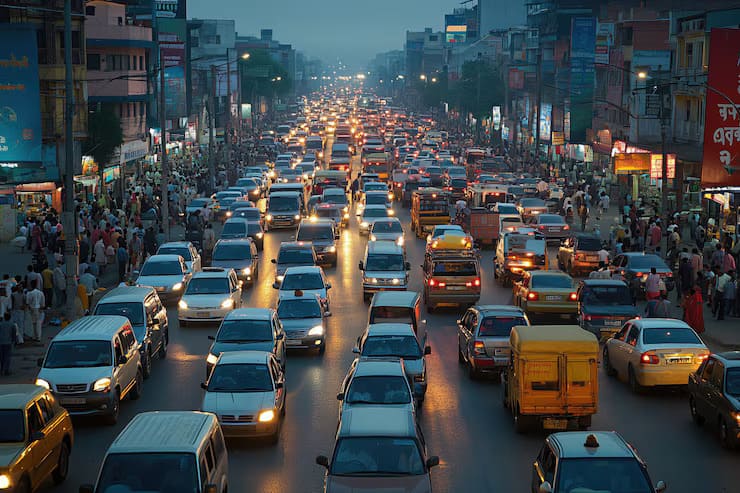In a major development aimed at combating Delhi’s chronic air pollution, the government has enforced a strict ban on fuel refilling for old vehicles, targeting petrol vehicles over 15 years old and diesel vehicles older than 10 years. The step, which was taken from July 1, is in line with traditional directions from the Supreme Court and National Green Tribunal (NGT), asking for the scrapping of “end-of-life” vehicles from Delhi roads.
Under the new rules, Delhi petrol pumps have been told not to sell fuel to these older vehicles. If owners attempt to refuel prohibited vehicles, a fine of up to ₹10,000 will be imposed and the vehicle seized and disposed of as scrap.
Why was this ban enforced?
New Delhi, a perennially listed among the world’s most polluted cities, is grappling with serious air pollution problems, especially during the winter season. Emissions from motor vehicles are among the major causes of the city’s poisonous smog, which has left courts and environmental authorities demanding immediate action.
The 2015 NGT order backed by a 2018 Supreme Court ruling ruled that 15-year-old petrol vehicles and 10-year-old diesel vehicles must not ply on Delhi roads as they contribute disproportionately towards the particulate matter and nitrogen oxide levels.
With the orders now being enforced, the Delhi government has slapped fuel refilling restrictions as a means of driving compliance, and auto cameras and cautionary systems are at its heart.
Technology-Based Enforcement: ANPR Cameras and Instant Alerts
As a measure to ensure effective enforcement of the ban, Automatic Number Plate Recognition (ANPR) cameras have been installed at nearly 400 petrol pumps across the city. The cameras automatically detect vehicles belonging to the banned category and instantly inform enforcement authorities, i.e., traffic police, transport department officials, and civic officials.
On detection, authorities can:
- Issue challans on the spot
- Seize the vehicle
- Transfer it to a notified scrapping center.
Apart from this, fuel pumps are now also mandated to display prominently a sign proclaiming the ban and have to provide weekly reports to the Commission for Air Quality Management (CAQM).
Public Response: Confusion, Anger, and Accusations of Bias
The policy implementation has been accompanied by a wave of protest from car owners, opposition leaders, and civil society groups. The majority of them lament that the regulation has been enforced abruptly, without providing the citizens with a good enough timeframe to adjust or find alternatives.
The problems complained of most frequently are:
“I paid road tax for 15 years. Why scrap it at 10?”
Diesel car owners, particularly owners of larger cars or commercial vehicles, believe that they are losing money by being cheated out of so many years of road usage.
“My car passes pollution standards. Why should it be banned?”
The age-based ban has been questioned by people because a fitness or emission-based system would be more sensible than scrapping well-maintained, compliant cars.
“No explanation from pumps or government”
Petrol pump staff are dissatisfied with a lack of technical support, with several ANPR systems unavailable or poorly installed. Pumps in the majority of locations are unaware of who is enacting the ban and how to turn cars away without confrontation.
Government’s Response: Temporary Pause and Reassessment
Considering the row, Delhi Environment Minister Manjinder Sirsa requested the Commission for Air Quality Management to temporarily halt the fuel ban until the system was operational. For clarity, he said that though the policy objective is to reduce pollution, technology preparedness and public awareness should come first.
A committee has been formed to study and rationalize implementation, and fuel pumps have been advised not to deny fuel to any vehicle until official notification is received.
The Transport Department, however, was quick to mention that the legal stand is still the same old cars are still banned on Delhi roads and a crackdown will continue on the basis of vehicle registration records.
Penalties and Scrapping Policy
Owners of vehicles who are found violating the ban may be penalized:
- ₹10,000 for private four-wheelers
- ₹5,000 for two-wheelers
Additionally, impounded vehicles will be scrapped under the government’s scrappage policy, under which older vehicles are voluntarily retired in exchange for incentives on purchasing new vehicles and possible tax rebates.
The policy is being rolled out to all Delhi-registered cars, though enforcement in adjoining NCR regions (like Noida, Gurugram, Faridabad, and Ghaziabad) varies from state to state.
Good Idea, Poor Execution?
Environmentalists have embraced the intent of the policy but criticized its execution.
Centre for Urban Sustainability policy analyst Dr. Aarti Verma says, “This is a big step which can massively improve air quality if well implemented. However, a poor rollout can introduce widespread confusion, public outrage, and poor compliance.”
Others support a mix of age limits and on-road emissions testing, leaving vehicles that meet Bharat Stage emissions and pollution standards on the road.
What’s Next?
The Delhi government is currently reworking the enforcement strategy for the ban with a focus on:
- Public notification and information campaigns
- Smooth operation of ANPR systems at fuel stations
- Encouraging voluntary scrapping instead of imposing fines
The bigger question is: Can a metropolis with millions of personal automobiles afford to lock up its citizens in pursuit of fresh air? Or is a strict policy the cost to be incurred?
As Delhi waits for a re-drafted directive, one thing is clear: environment versus convenience has entered a new phase and perhaps there’s no turning back.
Read Recent News
Liverpool and Portugal Star Diogo Jota Dies in Devastating Car Crash Alongside Brother
Google Faces $314 Million Fine for Unauthorized Collection of Android User Data
Without a Country: The Crisis of Statelessness Deepens After U.S. Supreme Court Ruling
